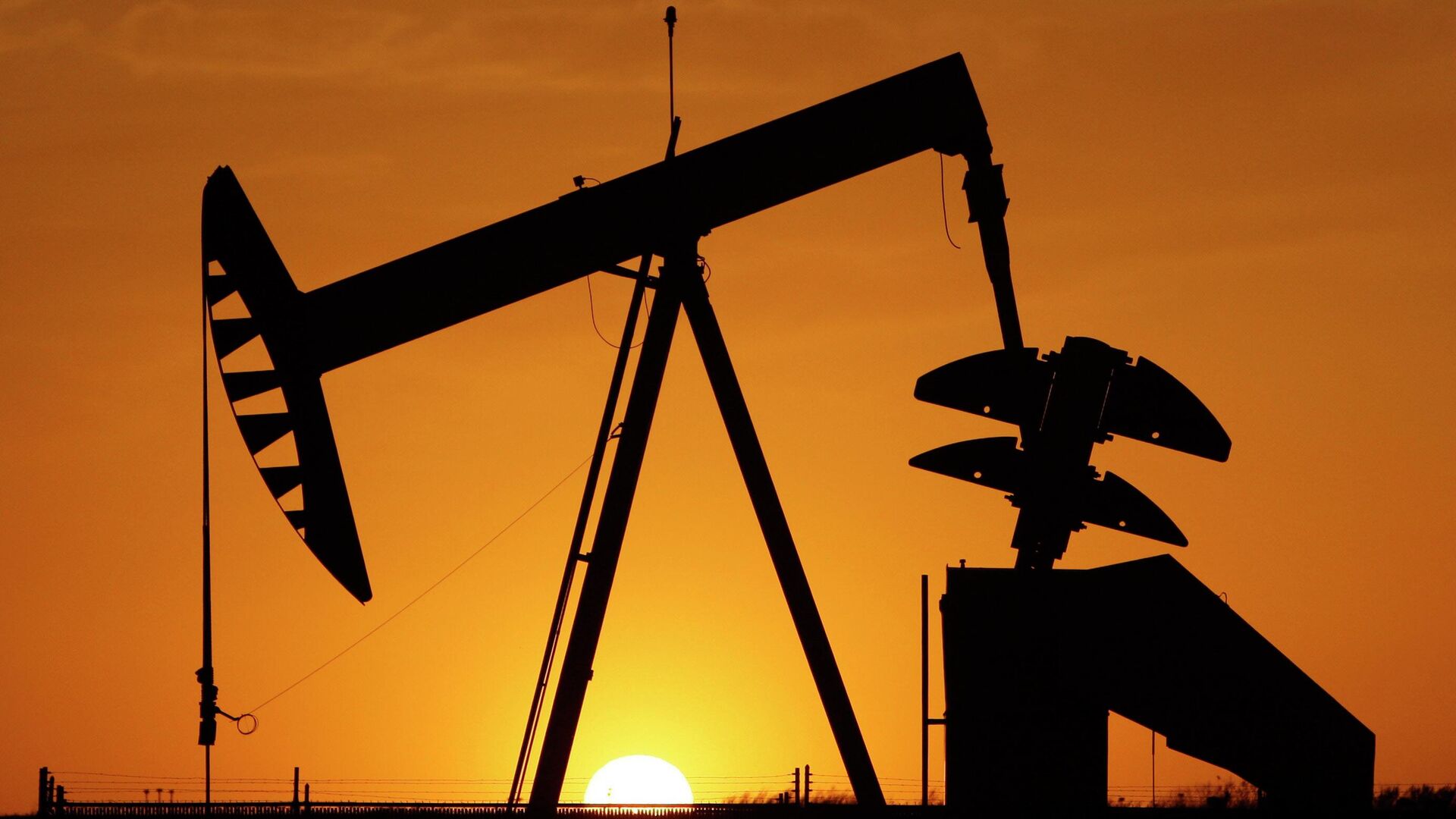https://sputnikglobe.com/20220419/oil-prices-tumble-5-on-global-commodities-selloff-after-imf-lowers-world-growth-forecasts-1094896785.html
Oil Prices Tumble 5% on Global Commodities Selloff After IMF Lowers World Growth Forecasts
Oil Prices Tumble 5% on Global Commodities Selloff After IMF Lowers World Growth Forecasts
Sputnik International
NEW YORK (Sputnik) - Crude oil prices fell 5% Tuesday amid a selloff in global commodity markets after the International Monetary Fund slashed its world growth... 19.04.2022, Sputnik International
2022-04-19T21:08+0000
2022-04-19T21:08+0000
2022-04-19T21:08+0000
oil prices
ukraine
russia
us
sanctions
international energy agency
inflation
https://cdn1.img.sputnikglobe.com/img/07e6/04/13/1094896760_0:99:2768:1656_1920x0_80_0_0_0df8ad0b9d4984ace1e9df7254791f9a.jpg
Brent, the London-traded global benchmark for crude, settled down $5.91, or 5.2%, at $107.25 per barrel. It plunged more than $6 earlier, hitting a session low of $106.81.New York-traded West Texas Intermediate, or WTI, the benchmark for US crude, settled down $5.65, or 5.2%, at $102.56. The intraday low for WTI was $101.55.Both crude benchmarks had gained about 15% over four previous days of trading as oil markets rallied on expectations of a further supply squeeze from Western sanctions imposed on Russia.The International Energy Agency has warned that roughly 3 million barrels daily of Russian oil could be shut in from May onward due to sanctions, or buyers voluntarily shunning Russian cargoes.Russian oil output has continued to slide in April, declining by 7.5% in the first half of the month from March, the Interfax news agency reported on Friday.World gross domestic product, or GDP, will likely expand by only 3.6% this year and next, the IMF said in an update of its World Economic Outlook published on Tuesday. That represented a downgrade of 0.8 percentage point and 0.2 percentage point, respectively, from the IMF’s previous GDP outlook published in December.World growth rebounded by around 6.1% in 2021 after a 4.9% slump in 2020 caused by the coronavirus pandemic.While the IMF revised down its GDP outlook, it raised its inflation expectations to an average of 5.7% this year across advanced economies, and 8.7% for emerging economies, citing inflation and other challenges from the Russia-Ukraine crisis. That was 1.8 points and 2.8 points higher, respectively, from the IMF’s previous inflation forecast.US bond markets sold off too on Tuesday amid fear of a recession in the United States as the Federal Reserve plans to fend off inflation with some of the most aggressive rate hikes in its history.After slashing rates to nearly zero at the height of the COVID-19 outbreak, the US central bank approved its first pandemic-era rate hike on March 16, raising rates by 25 basis points, or a quarter point. Many Federal Reserve officials have concluded since that the hike was too tame to rein in inflation galloping at 40-year highs.The central bank is considering as many as seven rate adjustments this year and continuing them through 2023 until inflation drops to its target of 2% a year, from a current 8%. While most Federal Reserve officials are considering up to half point rate increases a month, James Bullard, the central bank’s head for its St. Louis division, has suggested a maximum three-quarter point increase to expedite the fight against inflation.Bullard’s comments were one reason for Tuesday’s selloff in commodities, with gold dropping more than 1%, copper 2% and natural gas nearly 10% after dollar, which determines pricing for most raw materials, hit two-year highs, impacting international demand for goods.
https://sputnikglobe.com/20220419/world-might-face-rampant-food-inflation-due-to-conflict-in-ukraine-sanctions-against-russia-1094892340.html
ukraine
Sputnik International
feedback@sputniknews.com
+74956456601
MIA „Rosiya Segodnya“
2022
Sputnik International
feedback@sputniknews.com
+74956456601
MIA „Rosiya Segodnya“
News
en_EN
Sputnik International
feedback@sputniknews.com
+74956456601
MIA „Rosiya Segodnya“
Sputnik International
feedback@sputniknews.com
+74956456601
MIA „Rosiya Segodnya“
oil prices, ukraine, us, sanctions, international energy agency, inflation
oil prices, ukraine, us, sanctions, international energy agency, inflation
Oil Prices Tumble 5% on Global Commodities Selloff After IMF Lowers World Growth Forecasts
NEW YORK (Sputnik) - Crude oil prices fell 5% Tuesday amid a selloff in global commodity markets after the International Monetary Fund slashed its world growth forecasts for 2022 and 2023, citing runaway fuel and food costs and other challenges from the Russia-Ukraine conflict.
Brent, the London-traded global benchmark for crude, settled down $5.91, or 5.2%, at $107.25 per barrel. It plunged more than $6 earlier, hitting a session low of $106.81.
New York-traded West Texas Intermediate, or WTI, the benchmark for US crude, settled down $5.65, or 5.2%, at $102.56. The intraday low for WTI was $101.55.
Both crude benchmarks had gained about 15% over four previous days of trading as oil markets rallied on expectations of a further supply squeeze from Western sanctions imposed on Russia.
“With so much volatility in intraday oil prices, and extreme reactions to headline risks … I continue to expect that Brent will remain in a choppy $100 to $120 range, with WTI in a $95 to $115 range,” Jeffrey Halley, head of research for Australia and Asia-Pacific at online trading platform OANDA, said.
The International Energy Agency has warned that roughly 3 million barrels daily of Russian oil could be shut in from May onward due to sanctions, or buyers voluntarily shunning Russian cargoes.
Russian oil output has continued to slide in April, declining by 7.5% in the first half of the month from March, the Interfax news agency reported on Friday.
World gross domestic product, or GDP, will likely expand by only 3.6% this year and next, the IMF said in an update of its World Economic Outlook published on Tuesday. That represented a downgrade of 0.8 percentage point and 0.2 percentage point, respectively, from the IMF’s previous GDP outlook published in December.
World growth rebounded by around 6.1% in 2021 after a 4.9% slump in 2020 caused by the coronavirus pandemic.
While the IMF revised down its GDP outlook, it raised its inflation expectations to an average of 5.7% this year across advanced economies, and 8.7% for emerging economies, citing inflation and other challenges from the Russia-Ukraine crisis. That was 1.8 points and 2.8 points higher, respectively, from the IMF’s previous inflation forecast.
“Economic damage from the conflict will contribute to a significant slowdown in global growth in 2022 and add to inflation,” the IMF said. “Fuel and food prices have increased rapidly, hitting vulnerable populations in low-income countries hardest.”
US bond markets sold off too on Tuesday amid fear of a recession in the United States as the Federal Reserve plans to fend off inflation with some of the most aggressive rate hikes in its history.
After slashing rates to nearly zero at the height of the COVID-19 outbreak, the US central bank approved its first pandemic-era rate hike on March 16, raising rates by 25 basis points, or a quarter point. Many Federal Reserve officials have concluded since that the hike was too tame to rein in inflation galloping at 40-year highs.
The central bank is considering as many as seven rate adjustments this year and continuing them through 2023 until inflation drops to its target of 2% a year, from a current 8%. While most Federal Reserve officials are considering up to half point rate increases a month, James Bullard, the central bank’s head for its St. Louis division, has suggested a maximum three-quarter point increase to expedite the fight against inflation.
Bullard’s comments were one reason for Tuesday’s selloff in commodities, with gold dropping more than 1%, copper 2% and natural gas nearly 10% after dollar, which determines pricing for most raw materials, hit two-year highs, impacting international demand for goods.





